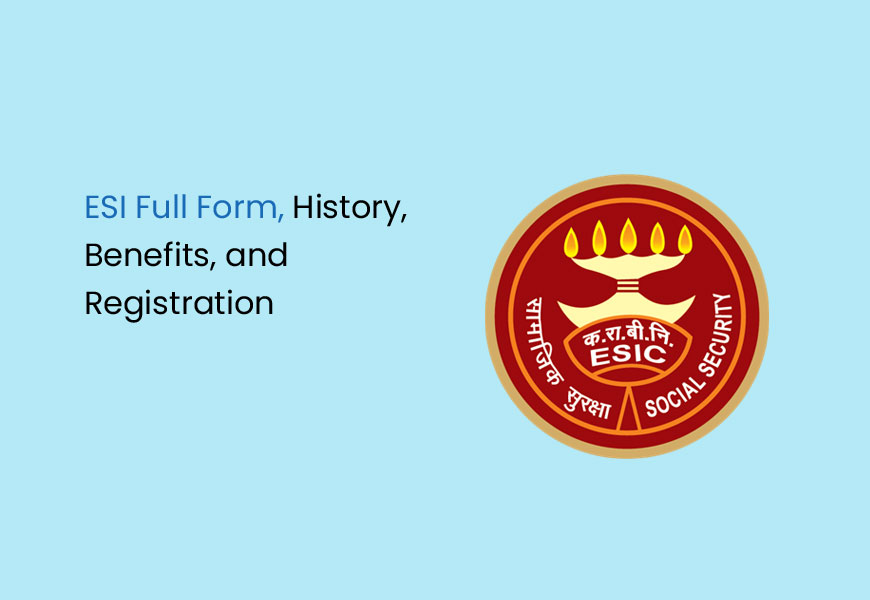What is the full form of ESI?
The full form of ESI is Employees’ State Insurance.
What is the full form of ESIC?
The full form of ESIC is Employees’ State Insurance Corporation.
What Is ESI?
ESI (Employees’ State Insurance) is a health insurance program tailored to provide medical and monetary benefits to Indian workers. This program is overseen by the ESIC (Employees’ State Insurance Corporation), an autonomous entity operating under the Indian Ministry of Labor and Employment.
A Brief Historical Journey of ESI
ESI came into being on February 24, 1952, with the purpose of serving as a health insurance service for Indian employees. The ESIC administers this program in accordance with the regulations laid out in the ESI Act of 1948.
The Path to ESI
The roots of ESI trace back to March 1943 when the Indian Government enlisted Professor B.N. Adarkar to prepare a report on a health insurance scheme for Indian laborers. This report played a pivotal role in the formation of the ESI Act in 1948. This act aimed to shield Indian workers from unforeseen events like illness, temporary or permanent physical disabilities, maternity-related concerns, and work-related injuries leading to loss of income.
From Inception to Implementation
The initial implementation of the Employee ESI scheme took place on February 24, 1952, in Kanpur. Originally targeted at laborers, the scope of the ESI Act broadened to include all employees earning below a specified wage threshold (currently set at Rs. 21,000).
In essence, ESI is a safeguard for workers, ensuring that their health and financial stability are protected during challenging times. It’s a program that underscores the importance of employee well-being and security in the Indian workforce.
Core Objectives of ESI Act, 1948
The ESI Act of 1948 was put in place with a clear mission – to offer financial support during various contingencies such as temporary or permanent disability, maternity, illnesses, and injuries resulting in death at the workplace, and more.
Who is Covered Under ESI?
As discussed above, the Employees’ State Insurance scheme provides social security benefits to employees and their families. Below, we have provided a breakdown of who comes under this scheme:
- Factories and Establishments: This scheme is mandatory for all establishments and factories with an employee count of 10 or more across India. This includes both organised and unorganised sectors. However, the states of Arunachal Pradesh and Manipur are exempted from this.
- Non-Seasonal Factories: For non-seasonal factories, 10 employees is the minimum to fall under the ESI scheme nationwide. This rule is uniformly applied and has no exceptions.
- Establishments in Different States: For establishments like shops, hotels, restaurants, educational institutions, newspaper establishments, cinemas, and private medical institutions, the minimum employee count to qualify for ESI registration varies from state to state.
Specific State-wise Minimum Employee Counts for Establishment Registration
| State | Minimum Employee Count |
|---|---|
| Himachal Pradesh | 20 |
| Jammu & Kashmir | 20 |
| Jharkhand | 10 |
| Kerala | 10 |
| Madhya Pradesh | 20 |
| Maharashtra | 20 |
| Manipur | 20 |
| Meghalaya | 20 |
| Mizoram | 20 |
| Nagaland | 20 |
| Orissa | 10 |
| Pondicherry | 10 |
| Punjab | 10 |
| Rajasthan | 10 |
| Sikkim | 20 |
| Tamil Nadu | 20 |
| Tripura | 10 |
| Uttar Pradesh | 20 |
| Delhi | 10 |
| Karnataka | 10 |
| West Bengal | 10 |
| Andhra Pradesh | 10 |
| Arunachal Pradesh | 20 |
| Assam | 20 |
| Bihar | 10 |
| Chhattisgarh | 10 |
| Goa | 20 |
| Gujarat | 10 |
| Haryana | 10 |
| Uttarakhand | 10 |
| Chandigarh | 20 |
| Daman and Diu | 20 |
| Dadra and Nagar Haveli | 20 |
| Andaman and Nicobar | 20 |
| Lakshadweep | 20 |
| Outside India | 20 |
The recent turn of events has seen the ESI scheme being expanded to cover more industries and sectors. These new additions include:
- Medical Establishments: Private medical institutions with a minimum of ten workers are covered by the ESI scheme.
- Educational Institutions: Private educational institutions with at least ten employees are included under ESI coverage.
- Entertainment and Hospitality Industry: The ESI scheme covers a variety of settlements coming under this category, like theatres, cinemas, hotels, restaurants, and stores. Workers in these sectors can now apply for ESI benefits.
- Media Outlets: Newspaper establishments are also covered under the ESI scheme.
The ESI scheme in India covers a wide range of sectors and various businesses in multiple industries. However, the specific eligibility criteria can vary in different states and types of establishments. The aim is to provide social security benefits to all employees and their families.
Required Documents for ESI Registration
To register for ESI, you’ll need these documents:
| Srn. | Document | Details |
|---|---|---|
| 1. | PAN Card | Your business’s PAN card is required. |
| 2. | Address Proof | This is to verify your business address. |
| 3. | Registration Certificate | A Private Limited company would need proof of registration. |
| 4. | Employee Details | A list of employees with their monthly incomes should be provided. |
| 5. | Company Officials | Details of associates, directors, and shareholders are needed. |
| 6. | Bank Statements | Proof of your company’s bank transactions is needed to verify when your operations began. |
Why ESI Matters for Employers and Employees
ESI, or Employee State Insurance, is a win-win situation for both employers and employees. Let’s break down why it’s important for each side.
ESI Benefits For Employers:
- Following Rules: ESI isn’t a choice but a rule for many businesses. Enrolling employees shows you’re following the law and avoiding legal issues.
- Stable Team: When employees feel cared for, they stay longer. This reduces the problem of people leaving and helps in building a reliable team.
- Less Money Stress: Medical bills can be big. With ESI, employers do not have to worry about the costs of any work injuries as ESI takes care of those.
- Good Reputation: Offering ESI makes your company look good. It tells everyone that you care about your workers’ health and safety.
- Work Going Smoothly: ESI cuts down on people being absent due to sickness. A healthier team means better work and less disruption.
ESI Benefits For Employees:
- Health Safety: ESI takes care of employees’ health. It makes sure they get medical help on time, without worrying about the cost.
- Money Help: During sickness, having ESI means not worrying about medical expenses and getting compensated for the time missed at work due to sickness.
- Good Medical Care: ESI makes sure employees can get the right treatment on time. It keeps them healthy and fit.
- No Worry: Knowing ESI is there gives peace of mind. Employees feel secure, knowing help is there if they need it.
- Safety of dependents: When an employee is registered in ESI, they can enroll all their dependents in ESI as well, thereby protecting their families in case of health issues and emergencies.
Easy ESI Registration And Compliance With TankhaPay
If you haven’t heard of TankhaPay, you are in for a treat. It’s a futuristic app that makes paying social security, handling statutory compliance, and managing employees super easy and hassle-free. It’s simple, straightforward, and saves you a ton of time and headaches. All you need to do is download the app and convince your employees to do the same and the TankhaPay team will take care of the rest. With it, you will be able to provide social security benefits such as ESI to even your employees in the unorganised sector.
Final Thoughts!
There you have it! We hope this piece helps you understand more about ESI and how TankhaPay can do wonders for you, your employees and your business.
FAQs about ESI (Frequently Asked Questions)
What is ESI full form in salary?
ESIC in salary stands for Employees State Insurance Scheme.
What is ESI full form in medical?
The full form of ESI is Employees' State Insurance Scheme.
What are the ESI contribution rates?
ESI contribution rates are different for the employees and employers as the contribution is made by both the parties involved. Employers contribute 3.25% of the wages, while employees contribute 0.75% of their wages. This is typically on a monthly basis.
When are the deadlines for ESI payment and filing returns?
Employers must pay these contributions by the 15th of the following month. Additionally, ESI returns are filed every six months
- November 11th for April to September
- May 11th for October to March.
It is to be noted that these dates might change occasionally due to official notifications from the ESIC department.
What are the penalties for non-payment and/or late payment of contributions?
Late payments incur a 12% per annum interest. Non-payments or delayed payments might lead to fines of up to INR 5,000 and imprisonment of up to 2 years. Also, if contributions are paid late, employers cannot claim deductions under the Income Tax Act, resulting in additional financial implications.






















I like the helpful information you provide in your articles.
I’ll bookmark your blog and check again here regularly.
I am quite sure I will learn plenty of new stuff
right here! Good luck for the next!
If you wish for to take much from this article then you have to apply such techniques to your
won weblog.
Highly descriptive article, I loved that a lot. Will there be a
part 2?